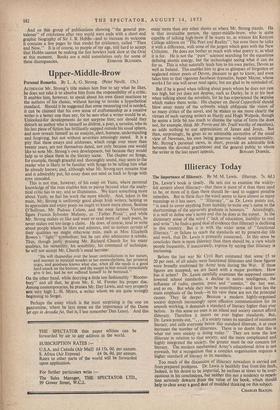Illiteracy Today
The Importance of Illiteracy. By M. M. Lewis. (Harrap. 7s. 6d.) DR. LEWIS'S book is timely. He sets out to examine the widely- felt anxiety about illiteracy—that there is more of it than there used to be, or more of it than there should be—and to suggest possible remedies. But in these days the word seems to have almost as many meanings as it has users. " 'Illiteracy', " as Dr. Lewis points out, "is used to cover anything from inability to write one's name to the shortcomings of the university graduate in honours." Accordingly, it is well to define one's terms and this he does at the outset. In the dictionary sense of the word ("lack of education, inability to read and write") he finds a good deal of evidence that illiteracy is declining in this country. But it is with the wider sense of "functional illiteracy," or failure to reach the standards set by present-day life and work, that Dr. Lewis is primarily concerned. In this sense he concludes there is more illiteracy than there should be, a view which people frequently, if inaccurately, express by saying that illiteracy is increasing.
Before the last war Sir Cyril Burt estimated that some 15 to 20 per cent. of all adults were functional illiterates and these figures were broadly confirmed by Army tests during the War. If these figures are accepted, we are faced with a major problem. How has it arisen? Dr. Lewis carefully examines the supposed causes: lowered school standards, a decline in native intelligence, the influence of radio, cinema, press and "comics," the last war, and so on. But while they may be contributory—and here lies the main emphasis of the book—in his view these are not the principal causes. They lie deeper. Because a modern highly-organised society depends increasingly upon effective communication for its smooth working, it demands a standard of literacy higher than ever before. In this sense no man is an island' and society cannot afford illiteracy. Therefore it insists on ever higher standards. But, Dr. Lewis points out, "... if a society raises its standard of minimum literacy, and calls everyone below this standard illiterate, it at once increases the 'number of illiterates. There is no doubt that this is what our own society is doing today." They are none the less illiterate in relation to that society, and the more complicated and highly integrated the society, the greater must be our concern for literacy. The modern mechanised Army's educational drive is not eyewash, but a recognition that a complex organisation requires a higher standard of literacy in its members. • Too much of the discussion of illiteracy nowadays is carried out from prepared positions. Dr. Lewis is healthily free from this fault.. Indeed, in his desire to be impartial, he inclines at times to be over- cautious in his conclusions, but neither this nor a tendency to repeti- tion seriously detracts from the value of his book, which should help to clear away a good deal of muddled thinking on this subject.
CHARLES SEATON.


































 Previous page
Previous page